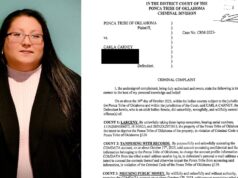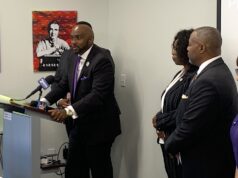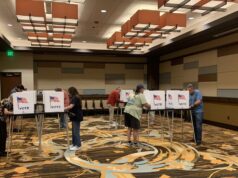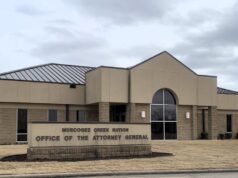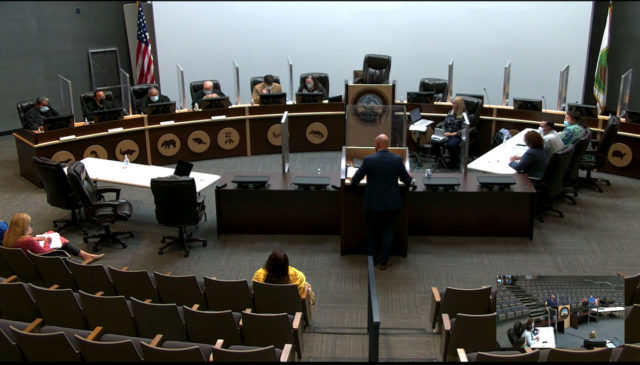
The Supreme Court of the Muscogee Nation this afternoon upheld a district court decision to deny petitions from two candidates alleging fraud and irregularities in the nation’s Sept. 18 primary election.
U.S. Postal Service delays resulted in more than half of absentee ballots cast in the Muscogee election to arrive after the 11 a.m. Sept. 18 deadline, according to tribal officials.
The 1,248 uncounted ballots represented one-third of all voters who attempted to vote in the election. Only 905 absentee ballots were counted.
“The court finds that the appellants have not met their burden to show an election fraud or irregularity as required under Title 19 Section 8-209,” Chief Justice Richard C. Lerblance said, announcing the decision. “Issues concerning delays in the United States mail do not justify this court overstepping its constitutional authority into the legislative branch of government.”
The appeal was brought by McIntosh District four-term incumbent Rep. Adam Jones III and Okmulgee District candidate Lanissa Jack-Melton, both of whom lost races for the National Council in the Sept 18. election. They contended that the failure to count the ballots constituted a mass disenfranchisement and violated citizens’ rights to vote and to due process.
The Muscogee Election Board, meanwhile, argued that, regardless of the unprecedented number of uncounted ballots, the election had been conducted according to law and the results should therefore stand.
The court agreed, announcing the decision from the bench Tuesday afternoon. Lerblance said a written decision would be released on Wednesday.
Two and a half hours after the Supreme Court issued its decision, the Muscogee National Council held an emergency meeting to consider legislation that would give the Election Board statutory authority to count the late absentee ballots, based on postmark rather than arrival time.
However, the legitimacy of the legislation was called into question because election board had already certified the existing results. Council members expressed confusion over whether the certification was official, whether the election board should have waited for the court’s written decision to proceed with the certification and how the legislation might interact with the court’s verdict and the board’s actions.
Muscogee Nation Attorney General Roger Wiley advised that “a strong possibility that if this law is challenged before the Supreme Court, it will be reversed because of the retroactive effect it has.”
The council voted 9–4, with two abstaining, to postpone the vote on the measure indefinitely.
‘A huge issue with the concept of fundamental fairness’
Representing Jones and Melton, attorney Carly Griffith Hotvedt argued that the court should either rule for the late absentee ballots to be counted or invalidate the entire election and order a re-do.
Although the irregular proceedings of the election were caused by the Postal Service, not the election board, she argued that both the board and the the ballot submission deadline itself did not offer absentee voters fairness or equal protection.
She mentioned that there have been significant postal delays during the COVID-19 pandemic, and that the issue was widely discussed in the context of the 2020 election in particular.
“The election board should have taken note of that and communicated to voters that there was a potential for significant delay and delivery of their absentee ballots upon return,” she argued, “which be considered component of their requirement to encourage voter participation pursuant to their statutory duties contained in the election code.”
At one point, Justice Andrew Adams III engaged Hotvedt in an inconclusive discussion of the definition of the word “cast” in the Muscogee Nation Constitution, which says in Article 4, Section 4, that “No candidate for office shall be considered elected (…) unless the candidate receives a majority vote of the votes cast.”
Adams suggested that “cast” might be read to mean a ballot Hotvedt, citing Merriam Webster, said “cast” means “the formal submission of a ballot.”
“Not the counting of a ballot, not the canvassing of a ballot,” she said. “The submission of a ballot.”
“With all due respect to the Merriam dictionary,” Adams said, “doesn’t their definition have to harmonize with the Muscogee Nation’s definition of a valid ballot?”
Hotvedt responded that, given that Muscogee law does not define the word itself, the court should use a “plain language” definition.
A final aspect of her argument took issue with the 11 a.m. deadline, which she said might not be all that bad on its own, but combined with other restrictions violated voters’ rights.
“There’s no alternative for somebody to hand deliver a ballot, there’s no alternative for somebody else to submit a ballot on behalf of someone else, with the exception of that person being disabled or homebound,” she said. “And there’s no opportunity for easy recognition or knowledge for a voter to determine if their absentee ballot has been perceived in a timely fashion. At least not that has been communicated widely to the voting public.”
“When you consider the constraints on being able to validly exercise the right to vote through absentee ballots,” Hotvedt added, “there’s a huge issue with the concept of fundamental fairness.”
‘The result of a choice made by the voter’
Representing the Muscogee Nation Election Board, Robert Seacat argued that despite the unprecedented number of excluded ballots, the Election Board followed all relevant laws and there was therefore no basis for counting the ballots or throwing out the election.
“The petitioners, in order to overturn an election, have a very difficult burden,” he said during arguments. “It’s a high bar. They have to be able to show the court that the irregularities were not just mere honest mistakes but involved fraud.”
Hotvedt had previously argued that, because the failure was on the part of a third party — the Postal Service — the Election Board’s intentions were not at issue.
Seacat mentioned that the Election Board, by law, cannot send out ballots early. He also went on to argue that late delivery is an inherent risk of absentee voting and pointed out that, in previous elections there have often been hundreds of ballots excluded because they arrive late. Voters choose to take that risk when they choose to vote absentee, he said.
The Nation’s in-person polling places are all in eastern Oklahoma, making absentee voting particularly convenient for voters living elsewhere in the state or country.
“I acknowledge from a convenience standpoint it doesn’t make a lot of sense,” Seacat said, “but, physically, when an election takes place, a voter has the opportunity to travel to Okmulgee to a voting precinct, to any voting precinct under the Muscogee (Creek) Nation and cast a ballot in person.”
Adams asked whether, by this logic, in-person voters have “heightened protection” and absentee voting becomes a subordinate voting method.
“I wouldn’t say it’s a lack of equal protection of the law,” Seacat said. “I would say it is the result of a choice made by the voter when you apply common sense.”
Seacat went on to argue that the relief Jones and Jack-Melton were seeking — counting the ballots or throwing out the election — would set a problematic precedent for future elections and would not, in fact, solve the issue.
“If the court just invalidates the election in total,” he said, “that doesn’t remedy the situation. Because the election board is still duty bound on a new election to follow the same rules.”










